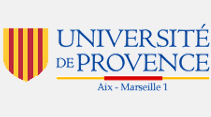Top Qs
Timeline
Chat
Perspective
University of Provence
Former French university From Wikipedia, the free encyclopedia
Remove ads
The University of Provence Aix-Marseille I (French: Université de Provence; Occitan: Universitat de Provença) was a public research university mostly located in Aix-en-Provence and Marseille.[3] It was one of the three Universities of Aix-Marseille and was part of the Academy of Aix and Marseille. On 1 January 2012, it merged with the University of the Mediterranean and Paul Cézanne University to become Aix-Marseille University, the youngest, but also the largest in terms of students, budgets and staff in the French-speaking world.
Remove ads
Overview
Summarize
Perspective
The University of Provence was founded on 9 December 1409 as a studium generale by Louis II of Anjou, Count of Provence, and subsequently recognized by papal bull issued by Antipope Alexander V.[4][5] In 1792, the University of Provence, along with twenty-one other universities, was dissolved during the French Revolution. The university was recreated in 1896. Following riots among university students in May 1968,[6] it was re-established in 1968 through a merger of the school of humanities in Aix-en-Provence and the science one in Marseille.[7] "The University of Provence [was] one of the most distinguished in France, second only to the University of Paris in the areas of French literature, history, and linguistics", according to Harvard University's website.[8]
In the academic year of 2007–2008, 23,056 students were enrolled.[2] Among them, 15,158 were female, while only 7,898 were male.[2] 3,255 students came from countries outside France, 44 per cent of these came from Africa.[2] 15,109 students studied in Aix-en-Provence, while others went to Marseille, Avignon, Digne, Lambesc, Arles and Aubagne.[2] Overall, its facilities spanned 258 143 m2.[9]
In 2007, the budget was 120,7 million euros, with 39,2 million euros available after wages.[10]
It had its own university press, Publications de l'Université de Provence.[11] It also had its own theater, the Théâtre Antoine Vitez, named for Antoine Vitez.[12][13][14][15][16]
Remove ads
Departments
- Ancient Civilisations
- Anthropology
- Applied Linguistics
- Arabic, Berber languages, Persian, Turkish, Yiddish, Hebrew
- Art History and Archeology
- Biology
- Chemistry and Physics
- Cognitive Psychology
- Developing and Differential Psychology
- Drama
- English
- Environmental Studies
- Ergology
- French
- Film Studies
- Geography and Urban Planning
- German
- Hellenism
- Hispanic and Latin American Studies
- History
- Information Technology
- Italian
- Korean
- Linguistics
- Mathematics, Computer Science and Mechanics
- Media Studies
- Miscellaneous Languages (Armenian, Hindi and Japanese)
- Music
- Philosophy
- Phonetics and French as a Foreign Language
- Portuguese
- Psychology and Psychopathology
- Romanian
- Slavic Languages (Russian, Bulgarian, Polish, Serbian, Croatian, Bosnian, Czech)
- Sociology
- Teaching Studies
- Visual Arts
Remove ads
Notable faculty and alumni

- Christian Bromberger, professor of anthropology and an expert of Iranian studies
- Georges Duby taught at the University of Provence.[17]
- Mansour Mohamed El-Kikhia: Libyan politician and member of the interim National Transitional Council (NTC).
- Sadaf Foroughi and Kiarash Anvari are graduates of the film studies department.
- Gilles-Gaston Granger taught there from 1964 to 1986.
- Martine L. Jacquot, writer, journalist
- Pablo Daniel Magee, writer and investigative journalist, followed Hispanic and Latin American Studies at the University of Provence.
- John H. Hubbard taught at the University of Provence.
- 2008 Nobel Prize laureate in literature J.M.G. Le Clézio earned a master's degree with a thesis on Henri Michaux from the University of Provence in 1964.[18]
- Annie Ousset-Krief, published historian and American Civilization specialist, taught at the University of Provence.
- Paul Veyne taught at the University of Provence in the 1960s.[19]
- Norodom Ranariddh, a Cambodian politician and prince. He is a close relative to the current king of Cambodia, Norodom Sihamoni.
- Ariane Labed, actress, film director.
References
External links
Wikiwand - on
Seamless Wikipedia browsing. On steroids.
Remove ads


